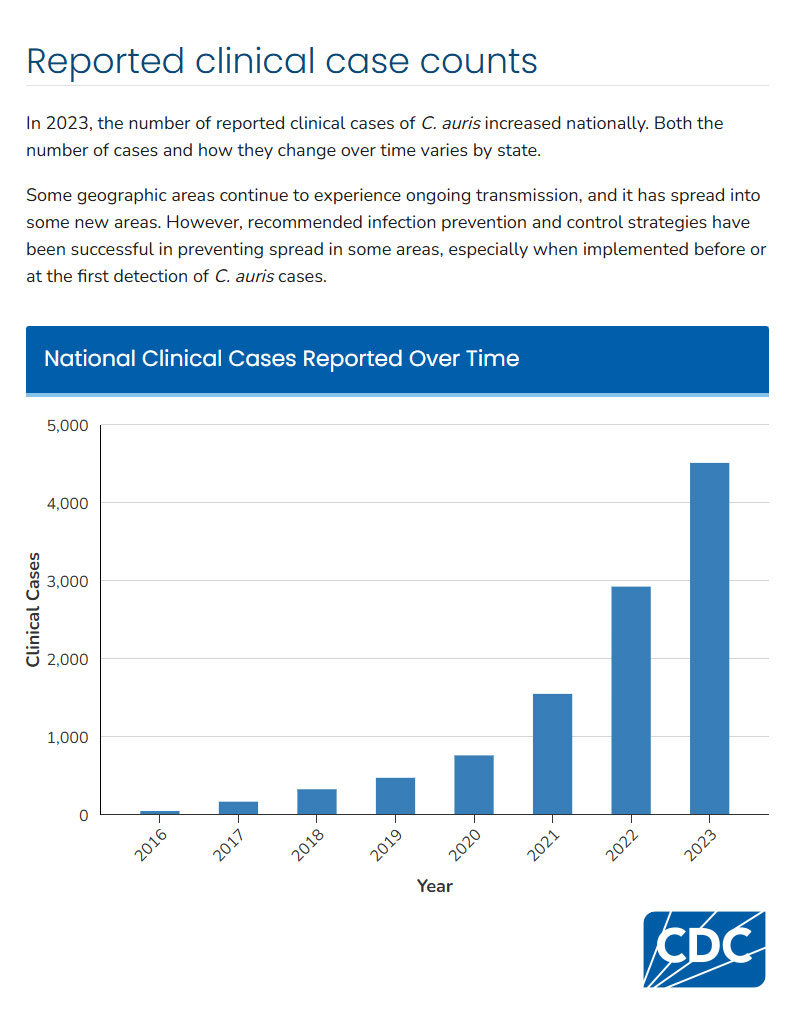
CDC Antimicrobial Resistance
@CDC_AR
#AntimicrobialResistance can affect anyone and makes infections harder to treat. Take action to slow the spread & keep yourself and others healthy.
#DYK? Keeping hands clean removes germs & helps you to avoid getting sick & spreading germs. On the go & can’t wash your hands? Use alcohol-based hand sanitizer (with at least 60% alcohol). Keep hands clean & combat #AntimicrobialResistance: buff.ly/s9QFlOO
Anytime antibiotics are used, they can cause complications, like C. diff infection, and lead to the development of #AntimicrobialResistance. Protect yourself from this life-threatening infection. #BeAntibioticsAware Know your risk: buff.ly/Ddlo47b
Infections caused by antimicrobial-resistant germs are difficult, and sometimes impossible, to treat. No one can completely avoid getting an infection, but there are steps you can take to reduce your risk and help stop the spread of germs. Read more: buff.ly/DbhM1RP

To survive, germs can share defense strategies (resistance mechanisms) with other germs. When infections caused by hard-to-treat germs have the right combo of resistance mechanisms, it can make antibiotics & antifungals ineffective. To learn more: buff.ly/T1dpOd6

Antibiotics only treat certain respiratory infections caused by bacteria, not infections caused by viruses. Anytime antibiotics are used, they can cause side effects and lead to the development of #AntimicrobialResistance. Learn more: buff.ly/o9z7r9f #BeAntibioticsAware




New report suggests that adhering to appropriate infection control practices helps healthcare facilities safely provide hemodialysis to patients regardless of their C. auris status, with low risk of transmission to other patients: bit.ly/4kwp4er
#DKY Germs that have developed #AntimicrobialResistance can share their resistance mechanisms with other germs, even ones that have not been exposed to antibiotics or antifungals? Learn more about how resistance spreads: buff.ly/PL6HuRu
#DYK: CDC’s AR Lab Network boosts nationwide lab capacity to rapidly detect #AntimicrobialResistance & inform local responses to prevent pathogens (germs) from spreading and protect people. Learn more: buff.ly/xb0v0b8

HCPs: Order FREE #BeAntibioticsAware print resources today! Help educate your patients about appropriate antibiotic use and fighting #AntimicrobialResistance. buff.ly/ZYiO8yI




#DYK: CDC leads the U.S. public health response to protect Americans from #AntimicrobialResistance (AR), a threat that can spread easily from one part of the U.S. to another. Read Full Timeline: bit.ly/40EAntI

Gonorrhea has quickly developed #AntimicrobialResistance to all but one class of antibiotics, and about half of all infections each year are resistant to at least one antibiotic. Learn how to protect yourself and your partner(s): bit.ly/4bQ4G4t

Sneezing? Stuffy or runny nose? You might have a cold. Antibiotics do not work against viruses that cause colds, and antibiotic use can lead to side effects and contribute to #AntimicrobialResistance. Learn more: bit.ly/4nHaPGq #BeAntibioticsAware

#DYK Candida auris (C. auris) is an urgent #AntimicrobialResistance threat? Clinical cases increased nearly eight-fold from 2019 to 2023. Learn more about this deadly fungus: bit.ly/44kfTZL

Clinicians treating CRE infections in NYC should be aware of recent changes in CRE epidemiology. Carbapenemase testing can help determine the best treatment options. bit.ly/40nSynh @nycHealthy
A healthy microbiome protects you from C. diff infection, but antibiotics can throw it off balance. Use antibiotics appropriately to stay protected and fight #AntimicrobialResistance. #WorldMicrobiomeDay bit.ly/4k0yCxN

#DYK? Foodborne infections are more common in summer. Sometimes these infections are antimicrobial-resistant. To help prevent infections, refrigerate perishable foods within 2 hrs (within 1 hr if food was exposed to temps above 90°F). Learn more: bit.ly/4eg6eGA

Why is fighting #AntimicrobialResistance critical? Since penicillin's discovery, germs have continued to develop new types of resistance. The bottom line: antimicrobial resistance develops rapidly after drug approval and release. Learn how to fight back: bit.ly/4btJ4tV

#DYK? Swimmer's Ear is often treated with oral antibiotics when only ear drops are needed. Unnecessary antibiotic use can cause side effects & lead to development & spread of #AntimicrobialResistance. #BeAntibioticsAware Learn more: bit.ly/451tAeA

Antibiotics are only needed to treat certain infections caused by bacteria, not infections caused by viruses. Use antibiotics appropriately to help combat #AntimicrobialResistance. bit.ly/3FCkMDX #BeAntibioticsAware

#DYK? Each year in the United States, at least 2.8 million people are infected with antimicrobial-resistant germs—at least 35,000 die. Learn more: bit.ly/3Kgswdv
